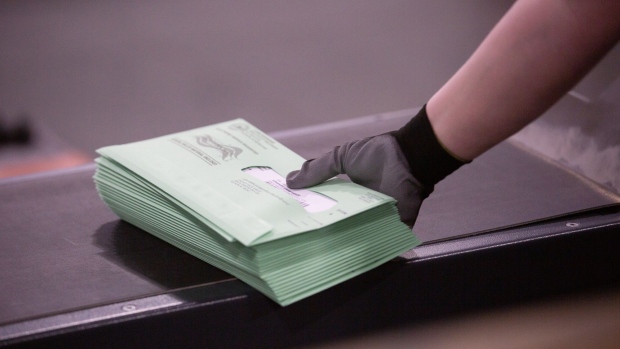Aug 12, 2020
States Shield Mail-In Voting From Postal Delay Under Trump Glare
, Bloomberg News

(Bloomberg) -- State officials wary of slower-than-usual mail delivery are extending mail-in ballot deadlines and making backup plans to smooth early voting in the weeks before the November election, but experts warn tens of thousands of ballots might still be thrown out.
Amid a historic surge of interest in mail-in voting because of the coronavirus pandemic, a new postmaster general appointed by President Donald Trump has barred overtime and changed other policies that some complain are slowing mail delivery. And because ballots in most states must be in the hands of state officials on Election Day, delays could mean uncounted votes.
At stake is the credibility of the vote count in the more than 30 states, including battlegrounds Arizona and Michigan, which require ballots be received by the time polls close on Election Day or even earlier. The results from those states could be more than enough to tip the election. Democrats have already accused Trump of trying to muddy the results by claiming, without evidence, that vote by mail is ripe for fraud. Ballot delays and uncounted votes would only deepen any controversy.
The concern over the Postal Service during the 2020 election -- the first that will rely so heavily on absentee voting -- has led state and local election officials to change vote-by-mail procedures and implement backup plans to prevent slow mail delivery from creating election havoc.
In 2016, missing a deadline was the second-biggest reason a mail-in ballot was rejected, according to the U.S. Election Assistance Commission.
“It’s definitely something we are concerned about and will be watching in November,” said Gabe Rosenberg, a spokesman for the Connecticut secretary of state.
Legislators in Nevada and Mississippi have recently changed state laws to allow ballots to be counted as long as they are postmarked by Election Day even if they arrive much later. The governor of Connecticut, Ned Lamont, made a similar change Monday by executive order for the state’s primary, while Minnesota agreed to set aside its deadline as part of a court settlement.
Voting rights groups are also asking judges to extend ballot deadlines, arguing that they disenfranchise voters who have done nothing wrong. Justin Levitt, a Loyola Marymount University professor tracking coronavirus-related elections lawsuits, said judges in Florida, Michigan, Pennsylvania and three other states have already declined to do so, but other cases are still pending.
“Things are, essentially, still in some flux,” he said.
Elections officials are also looking at other changes.
One of them involves switching some ballots to first-class mail, which costs 55 cents but arrives within two to five days, from bulk mail, which can take 10 days.
Washington State Secretary of State Kim Wyman said that switching all ballots to first-class mail would add another $2 million to the cost of the election in her state, which conducts all-mail elections.
Other states are looking at less expensive workarounds. Michigan, Pennsylvania and Georgia, among others, have invested in ballot drop boxes, secure metal cabinets installed outside public buildings where voters can bring their ballots, no stamp needed.
Rosenberg said Connecticut spent $400,000 of its CARES Act stimulus funding to buy drop boxes for every town, which it tested during Tuesday’s primary. He said if mail delivery times become a problem close to the election, they’ll more heavily promote the drop boxes in October and November.
“Voters can deliver their ballot directly to the towns without having to worry about the Postal Service,” he said.
Several states, including Georgia, Michigan, North Carolina and Pennsylvania, are also adding technology that would allow both elections directors and voters to track ballots as they move through the postal system, similar to the way consumers can track something they bought online before delivery.
Postmaster General Louis DeJoy, who was appointed by Trump, announced a reorganization last week that drew ire from Democrats who called for an investigation into whether the staffing and funding changes pose a threat to mail-in ballots for the November election. Also, additional money for the Post Office, which Republicans reject, has become one of several sticking points in negotiations between top congressional Democrats and the Trump administration over a coronavirus relief package.
U.S. Postal Service spokeswoman Marti Johnson said in a statement that the agency was working closely with elections officials to ensure that ballots are properly marked and sorted to ensure prompt delivery.
“The Postal Service has ample capacity to adjust our nationwide processing and delivery network to meet projected election and political mail volume, including any additional volume that may result as a response to the Covid-19 pandemic,” she said.
Washington State’s Wyman, a Republican, said she would be keeping a close eye on Postal Service funding and personnel over the coming weeks.
“If they are fully resourced, I’m not worried about it at all,” she said. “If something were to happen to their resources, on a scale of 1 to 10 my concern level is probably a 12.”
At the same time, the Trump campaign is fighting the states’ changes. It sued in Nevada, arguing that the state’s recently passed law is unconstitutional because a later deadline “effectively postpones and prolongs” the election past the date set by Congress -- even though that was already state law.
Trump has also argued that only votes that can be tallied on Election Day should count.
His campaign is also pushing back on drop boxes. In a lawsuit filed in Pennsylvania, campaign lawyers are seeking to limit the places where elections officials can place them, arguing that locations like shopping centers, retirement homes, college campuses and fire stations are not secure and do not meet the legal requirement for a polling place.
©2020 Bloomberg L.P.







